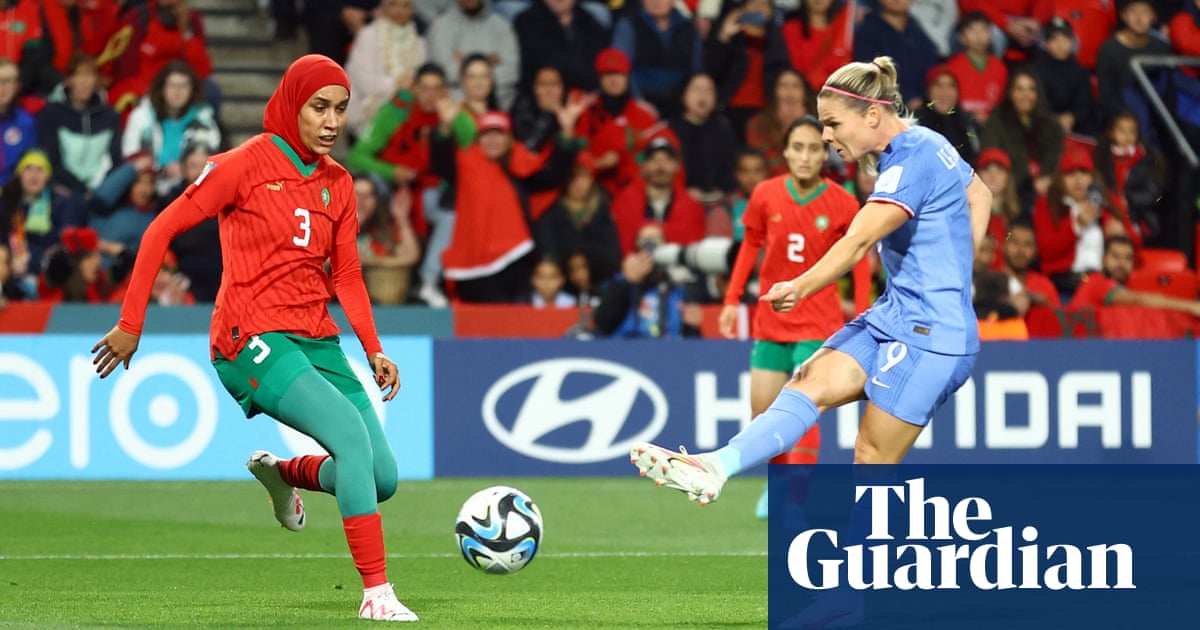
The second of three minutes of added time at the end of extra time. The rearguard that Sweden had mounted since the dismissal of Marcus Danielsson after 100 minutes was nearly over. Penalties seemed within touching distance. Then Ukraine, yet again, worked the ball out to Oleksandr Zinchenko on the left. He crossed and the substitute Artem Dovbyk plunged forward to head past Robin Olsen. Blue shirts cavorted in delight. Yellow shirts folded. A very large topless shaven‑headed man, moobs atremble, ran uncertainly on to the pitch and sank to his knees in ecstasy. And with that a gruelling last-16 tie came to an end. Ukraine will face England in the quarter-final in Rome on Saturday.
What had for 90 minutes been a crisp game of no little quality became in extra-time a grim trudge. Danielsson’s red card changed the dynamic, but both sides looked exhausted and there were countless interruptions as players went down with injury. Ukraine, having slightly faded, came again with the extra man, but Sweden’s two banks of four seemed resolute as ever, at least until yet another switch of play undid them.
Ukraine’s campaign had been undermined by the injury to the left-winger Oleksandr Zubkov in the defeat against the Netherlands. He had finished the season strongly with Ferencvaros and was man of the match in the friendly win against Northern Ireland last month. Marlos came on for him in that game but was so off the pace he was withdrawn before full-time. Ruslan Malinovskyi was shifted from midfield on to that flank for the other two group games but he was relegated to the bench here as Andriy Shevchenko returned to the 3-5-2 with which he had experimented before the finals tournament.
That meant the return of the veteran Taras Stepanenko alongside Serhiy Sydorchuk at the back of the midfield, the first time the pair had started together in this European Championship. They provided an additional screen in front of the defensive line, essentially forcing Sweden to go wide and look to get crosses into the box, just as they had brought in Dejan Kulusevski. He had missed the start of the tournament after a positive Covid test but here was alongside Alexander Isak, when Marcus Berg or Robin Quaison may have preferred that type of service.
Shevchenko is an astute coach and has clearly improved Ukraine. This is a better, more proactive side than the one that limped out of the last European Championship without scoring a goal. After all the furore about the shirt, with the map of Ukraine including Russian-occupied Crimea in the jacquard, and the controversial slogans on the neck, the sense was that this was a team with a cause which made the limp performance against Austria so surprising.
Perhaps the rhetoric always came from outside the squad, or perhaps football games, ultimately, are largely about football and Ukraine lost against Austria in the group stage not because of some patriotic failure but because they could not cope with Austria’s physicality and organisation.
Which, frankly, against Sweden did not bode well, for no national side is so consistently and effectively physical and well organised as it is – despite that curious 25-minute wobble against Poland.
In that sense the switch to 3-5-2 made sense: overman in the centre at the back and in midfield, and hope the wing-backs could cope with the wide midfielders without being overmanned by overlaps from Sweden’s full-backs. It worked. “With this performance and commitment,” said Shevchenko, “our team has deserved the love of the whole country. We knew how our team should play from the first minutes. We knew who could strengthen us [during the game]. The plan we had developed has worked well.”
As it turned out, the change of shape had a far greater impact as Zinchenko, quiet until now, put Ukraine ahead with a stunning goal. Mykola Shaparenko, relishing his deeper role, began the move with a sweeping ball out to the right wing‑back Oleksandr Karavayev. He turned it infield to Yarmolenko who paused, jinked past his man and then played a delightful pass with the outside of his right foot to the left wing‑back who lashed it through Olsen’s dive.
Sweden, after early promise, had gone a little flat, and the game seemed to be drifting towards half‑time when Emil Forsberg found space outside Ukraine’s midfield shield. Illya Zabarnyi moved to close him down but too late, and Forsberg’s shot deflected off him, over Heorhiy Bushchan and into the roof of the net.
And that became the pattern of the game: Ukraine’s wing-backs against Forsberg. Ten minutes after the break, Karavaev and Yarmolenko combined to create a chance that Sydorchuk crashed against the outside of the post.
Two minutes later, a delicate Forsberg curler plinked against the base of the post at the other end. A few minutes after that Forsberg hit the bar.
But the goal would not come, not for Sweden and then, it seemed, not for Ukraine, until, at the very last, it did. By then both sides looked exhausted but, as England learned against Croatia in Russia, you can never trust an opponent to be tired when you need it.












